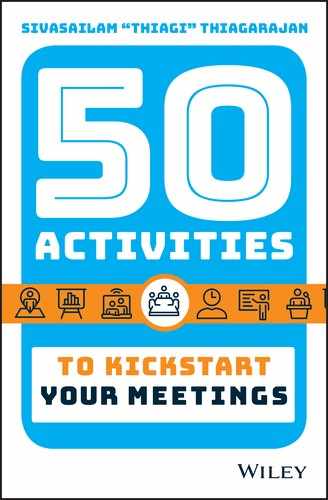9
DYSFUNCTIONAL MEETINGS
This collaborative activity requires that participants identify and explore the causes of dysfunctional meetings. The activity prepares the participants to avoid contributing to the inefficiency of meetings.
Synopsis
Each participant writes four Cause Cards that identify sources of unproductive meetings. These cards are redistributed to the participants, who exchange them and form teams. The teams prepare posters to reflect three selected cards.
Purpose
To explore causes of dysfunctional meetings
Participants
Minimum: 4
Maximum: Any number
Best: 8–20
Time
20–40 minutes
Supplies and Equipment
- Twenty or more Cause Cards with different reasons for unproductive and inefficient meetings.
Here are some examples:
- Not sticking to the agenda
- Domination by a few people
- Critical information not available
- Critical people are absent
- Four blank index cards for each player
- Timer
- Whistle
- Flip charts
- Felt-tipped markers
Room Setup
Leave plenty of free space for the participants to move around and talk to one another.
Preparation
Prepare a set of Cause Cards. Before the workshop, prepare a collection of cards. Each card should contain a statement about a cause of unproductive and inefficient meetings. Prepare at least two Cause Cards for each anticipated player. If you cannot come up with a sufficient number of different Cause Cards, use duplicates.
Flow
Getting started. When the players are ready, announce, “I'd like to begin with an activity that will help us get to know each other. It will also allow us to discover why many of our meetings are a total waste of time.”
Card writing by players. Hand out four blank index cards to each player. Ask them to write a statement about a cause of unproductive and inefficient meetings. These statements need not reflect the personal views of the writer; they should represent commonly held opinions. Give some sample statements to the group.
Distributing cards. After about three minutes, collect Cause Cards from the players. Add your prepared cards to this pile. Mix the cards well and give three cards to each player. Ask players to study the causes written on the cards and arrange them from the most to the least frequent causes.
Exchanging cards. Instruct players to exchange Cause Cards with one another to make their hands better reflect their personal opinions. In this phase, any player may exchange cards with any other player; every player must exchange at least one card.
Forming teams. Ask players to compare their Cause Cards with one another and to form teams with people holding cards that they like. There is no limit to the number of players who may team up together, but a team may keep no more than three cards. It must discard all other cards, and the three cards it retains must meet with the approval of all team members.
Preparing a poster. Ask each team to prepare a graphic poster that reflects the three final cards. This poster should not include any text. After five minutes, ask each team to read its three cards, display its poster, and explain the symbolism.
Link to the Meeting
Conduct a brief discussion to identify the causes that are likely to interfere with scheduled meetings. Ask the participants to come up with personal strategies for removing these causes or reducing their impact.
Reuse the Activity
Instead of asking the participants to prepare cards related to generic meeting management, you may require cards related to the specific agenda of the meeting. For example, if a meeting is designed to explore new products, the participants may be asked to write Needs Cards that identify the needs of different customers.
